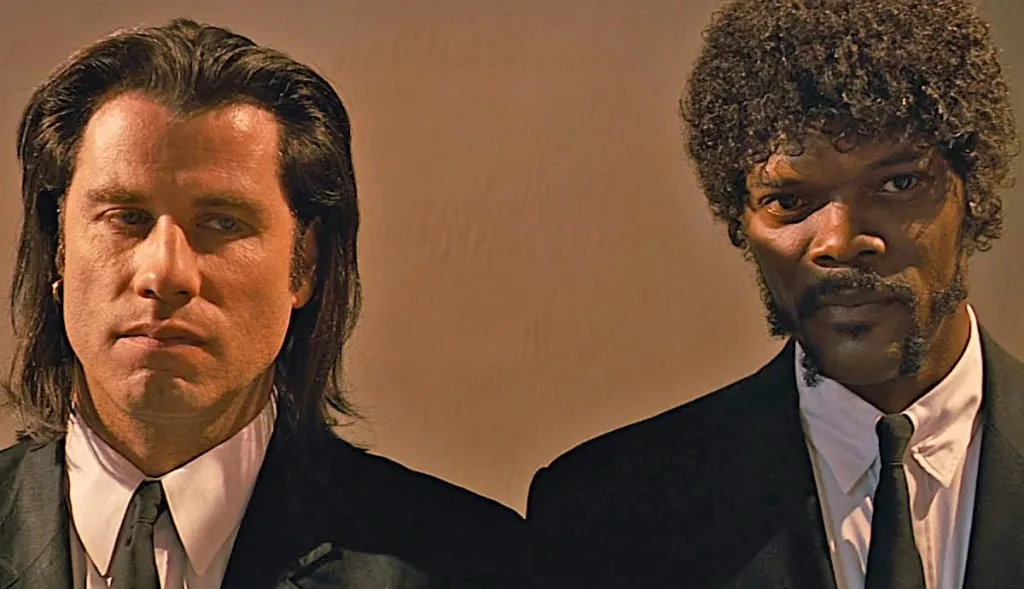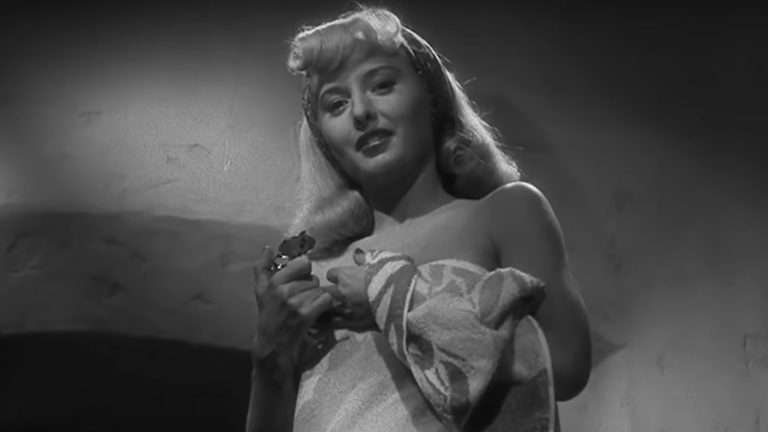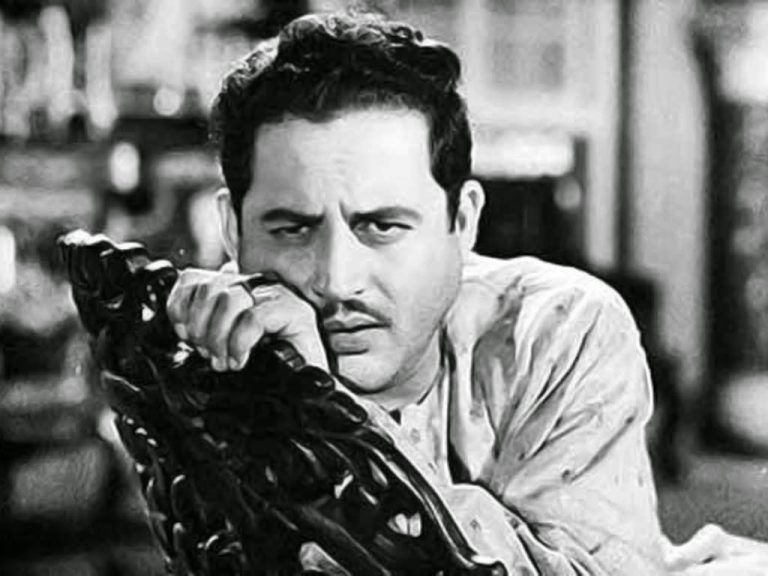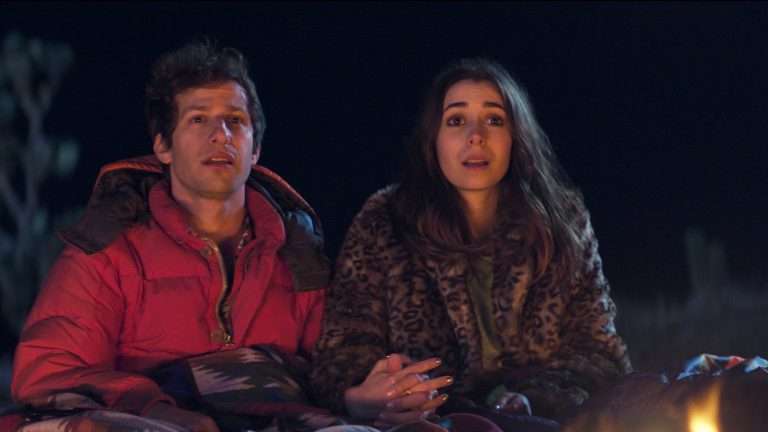Quentin Tarantino likes to challenge his audience: their threshold for violence, understanding of qabalistic motifs, and ability to follow an orchestra of subplots that could really do with a tune-up. The director’s second feature film and considered opus is audacious, iconic, and pastiche, unraveling in a seedy mid-90s LA. Seven title cards break up the movie, but not into seven neat narrative strands—there are three subject line stories that borrow scenes and characters from each other in scattergun order, a few “preludes” thrown in for good luck. Any attempt at a logline ends up as a list of archetypes—two hitmen, two robbers, a boxer, a gangster, and his wife are intermittently embroiled in crimes, drugs, and fights.
To expand: Samuel L. Jackson and John Travolta play the two suited-up hired guns Jules Winnfield and Vincent Vega, both inexplicably hunting for their boss’s briefcase. Vincent is asked to play chaperone for said-boss’s wife, Mia (Uma Thurman), slurping milkshakes in a happy-go-lucky 50s diner like their veins aren’t throbbing with smack (at one point mistaken for cocaine, giving Mia a near-death experience). Pumpkin and Honey Bunny (Tim Roth and Amanda Plummer) agree to one last couple’s robbery, and somewhere in the city, Bruce Willis accidentally wins a boxing match (yes, you read that right). Willis’ prize-fighter, Butch, ends up brandishing a katana against his sex slave captors, and all these characters step on each other’s toes at one point or another. Like “Magnolia,” but with more (completely random, and therefore fittingly nihilistic) bondage.
Before even hitting play, “Pulp Fiction” wears its nihilism like a banner, with “pulp fiction” referring to a type of plebeian action magazine bought on the cheap during the early 20th century, usually depicting lurid low-life tales lacking in moral fibre or philosophical thought. Although we’re viewing “Pulp Fiction” through a philosophical lens, nihilism is the philosophy of purposelessness, and “pulps” were in no way weighted by their leather-bound bounty of thought, emotion, or intention.
They were spineless scraps of wood pulp, costing 10 cents a pop and using exploitation to distract working-class readers from their rough, tedious lifestyles. Tarantino’s titular comparison between his 1994 film and those untrimmed, churned-out pulps is a commentary on the devalued environment “Pulp Fiction” takes place in: modern urban America. Nihilistic, half-dressed, gun-slinging in the alleyways of a metallicized Western Frontier.
Tarantino’s indicative locution extends beyond just the title. Butch makes a direct point on how “[American] names don’t mean shit,” when a cab driver, more obsessed with death than Jim Morrison, won’t quit asking questions. Tarantino’s word play is a tool, microcosmic of the larger America that’s void of a meaningful society, where words are plucked randomly from Most Popular Baby Names catalogs and TV shows. Like Macon Dead blindly baptizing his children as whatever phrase his finger landed on in the bible in Song of Solomon. After all, words are but the meaning of certain letters grouped together. When you remove that meaning, there’s nothing but negative space left in the dictionary’s wake, inherently nihilistic, like the America Tarantino chooses to traverse in “Pulp Fiction.”
The Samurai sword Butch arms himself with when breaking from captivity, the Ezekiel 25:17 verse Jules reels off at the end of the movie, the Holy Grain theory of the gold-spewing briefcase…Tarantino holds these holy symbols up as mirrors into the desecration of America, drawing comparisons through duality. Many critics have read these motifs as the banalisation of religion, that governing body which once ruled the medieval ages, now used as throwaway props in the movies. It’s a new land now, where Native Americans—in all their ritualistic living, giving thanks to the divine through fire dances, Peyote-anointed prayers, and purifying smoke cleanses—have been kicked out to make room for handguns, mod cons, and Drive Thrus. Insert scene of Vincent slurping a Vanilla Coke, firearm in his pocket like loose change.
Movies That Make You Think: 10 Great Dark Comedy Movies From The 20th Century

These biblical reflections that Tarantino glares in our eyes are shiny blank nothings; an abyss of a world where one’s name and how it relates to your family heritage, birthplace, and/or religious beliefs (as it once did) means nothing. Just vowels thrown together, which is why Jules misquotes Ezekiel. Words have lost their weight in a modernised landscape of nihilism. “I’m an American, honey. Our names don’t mean shit.” Empty as the briefcase Vincent and Jules are chasing—one of cinema’s greatest MacGuffins containing nothing more than a prop lightbulb. The fact that the lock combination is 666, in association with Satan, is yet another biblical nod to show where sanctity once was, or is expected to be; there is, in fact, nothing. Just more empty light glaring into our eyes, fallen like the angel 666 is so synonymous with.
The phrase “senseless violence” is a common tagline for Tarantino movies. It’s one of his most famous trademarks, and if you asked someone to draw an emblematic cartoon of the auteur, he’d no doubt be splattered in blood. Just as many of his characters end up—The Bride (Kill Bill), Daisy Domergue (The Hateful Eight), the entire cast of Reservoir Dogs. All dripping red and trailing guts onto the carpet. Senseless violence and nihilism, the philosophy of senselessness, are like two peas in a metaphysical pod. Peas that German thinker Friedrich Heinrich Jacobi was popping from their case in 1799 when he first coined the term “nihilism” in direct opposition to Emmanuel Kant’s honeyed idealism.
Jacobi saw the common epistemological thesis of the universe as flawed. He supposed it was, in fact, morally apathetic and wanting for the higher purpose his society subscribed to. He wasn’t the first nor the last to have this neutral worldview that could easily sway into empowerment, relief, or annihilation, and as modernism grew, artists and philosophers took an increasingly nihilistic view towards the washing machines, gang violence, and pop culture references that overtook our once natural environment.
Industrialisation tempered Mother Nature and mystical beliefs into microplastics and unrottable Big Macs, and as a commentary on nihilism, it’s no wonder “Pulp Fiction” makes such a fuss about the McDonald’s menu, dedicating an entire car journey to comparing French and American burgers. Jules and Vincent’s insouciant street cruising and dialogue on “Le Big Macs” destitutes what should be a tense scene of fear and guilt (i.e., going to kill a man) and has no bearing on plot, emotion, or character development. Nihilistic to its core.
Nihilism is often, though not inherently, motivated by an impulse to destroy. The villainous anarchy of a scar-faced Joker setting fire to money stacks and blowing up hospitals for kicks is a pertinent symbol of this. “Some people just want to watch the world burn,” is how Joker is described in Christopher Nolan’s 2008 hit sequel “The Dark Knight.” Could this be applied to Tarantino’s characters, too? The overarching theme in Pulp Fiction’s quasi-coherent narrative is redemption.
More often than not, forcing small redemptions in the face of apparent nihilism, desperate to squeeze some sort of meaning, justice, or satisfaction out of the empty tube of toothpaste that is Tarantino’s America. The director’s signature bloodlust fits in with this lawless Joker symbol, but “The Dark Knight” is too grave, Gotham too laden with heroic mottos and emotional romance to be nihilistic. Whereas “Pulp Fiction” doesn’t care so much, as you can tell from the jumbled chapters and names like Honey Bunny.

More on the Subject: 10 Great American Movies That Explore Nihilism
“Pulp Fiction” makes more narrative links than, say, a David Lynch film, but the chains are worn in and weakening. Scenes don’t entirely relate—and what is meaning but the relation of one thing to another? Significance, purpose, feelings…these are generated from the connection of ideas and events, without which things just happen. In isolation, void of interpretation, existing totally within themselves. Nihilistically. Same as many dislodged, free-floating dialogues in “Pulp Fiction,” such as Butch’s girlfriend listlessly describing her opinion on pot bellies.
Instead of order, “Pulp Fiction” runs on punchy dialogue at breakneck speed to nowhere, like someone hit x2 on some college kids’ hotbox ramblings. The three interweaving, non-linear narratives duck and spin in what we think will be a grand complex plot. One that will finally reveal itself and make us go “ah!” when Tarantino (we assume will) step back to show us the larger picture. Except he never does. It’s a wild goose chase where characters (Vincent) get hosed down by a machine gun only to reappear in a later scene unscathed, pissing the timeline laws of cinema to the wind.
Mundane conversations on foot massages don’t add anything to the narrative on purpose, almost satirical in its point of making no point. Even the gangsters among this nihilistic urban jungle talk empty-headed rubbish, not like the film noir heroes of old with lofty motives of avenging the family name or facing existential questions.
Nihilists don’t even ask why—that great monosyllabic word undercutting all of infinite philosophical thought—because they don’t believe in the question, nor any theoretical answer you could pose in response. Maybe they laugh in the face of a cup half full/empty, saying Why the hell does it matter, anyway? Maybe they just shrug, or smash the glass, or chug it in one go. Their reaction to the glass—to the why—is just as meaningless to them as whether you see it as optimistically full or pessimistically empty. It’s nihilistically nothing to them, which is the very meaning of the word “nihil”, Latin for “nothing”.
Tarantino’s nihilistic setting feels more statement than goad, at a stretch even finding the fun inside this depressing Weltanschauung. The liberation in what does the glass matter anyway? Brandish a Samurai sword. Disregard all the sacred cultural heritage it imbues and stab some white guy with it in petty revenge. What Butch thinks is an oath of loyalty to some ancient honor really just makes him look a bit silly. In this way, the director flows against the current of stereotyping, stripping back the machismo of white American heroes down to silly little men making meaningless moves on a meaningless chessboard.
This nihilistic interpretation of life isn’t necessarily “bad”—characters dance barefoot to Chuck Berry, save lives as well as take them, enjoy the delicious taste of hamburgers, and feel moments of relief and redemption. Like when finding the briefcase, or when Pumpkin and Honey Bunny make it out of the robbery by the skin of their teeth, adrenaline in their blood, and cash in their hands. Nihilistic, sure, but maybe it’s not so bad after all? Depends on who you are, the robber or the robbed.







![Captain Marvel [2019] Review: Strong Hero, Weak Movie.](https://79468c92.delivery.rocketcdn.me/wp-content/uploads/2019/03/Captain_Marvel_HOF_Review-768x321.jpg)
